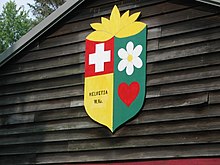Helvetia, West Virginia
Helvetia | |
|---|---|
Census-designated place (CDP) | |
| Coordinates: 38°42′21″N 80°12′4″W / 38.70583°N 80.20111°W | |
| Country | United States |
| State | West Virginia |
| County | Randolph |
| Area | |
• Total | 1.815 sq mi (4.70 km2) |
| • Land | 1.815 sq mi (4.70 km2) |
| • Water | 0 sq mi (0 km2) |
| Population | |
• Total | 59 |
| • Density | 33/sq mi (13/km2) |
| Time zone | UTC-5 (Eastern (EST)) |
| • Summer (DST) | UTC-4 (EDT) |

Helvetia is a census-designated place (CDP) in Randolph County, West Virginia, USA. As of the 2010 census, its population was 59.[2] The isolated community was settled by Swiss starting in 1869, and is known today for maintaining Swiss traditions, food, and folkways.
History
After the end of the Civil War, a group of Swiss and German-speaking immigrants calling themselves the Grütliverein formed in Brooklyn, New York. The members agreed that they would all emigrate to another section of the country together when the time was right.
A member of the society named Isler surveyed large swaths of the eastern West Virginia mountains for a Washington-based firm, and reported back to the society on the richness of the country. A committee of six men was assembled, and left Brooklyn by rail on October 15, 1869. They arrived at Clarksburg and began the difficult work of traveling by foot over the mountains.
They reached a plot that was on offer for sale on October 20, and were disappointed by the extreme thickness of the wilderness in this lightly settled and rugged country. The land was very reasonably priced, though, and they had offers of other assistance from the land agents in Clarksburg if they would encourage further settlement in the area. After hearing the report of this exploration, the society members all decided they would go to West Virginia.
Because of the low cost of the land, all of the settlers were able to buy their own tracts, ranging from a small house lot to hundreds of acres. An area of 100 acres (0.40 km2) was set aside at the center of the community and laid off into lots, which were sold to skilled tradesmen as an incentive.
At the beginning of 1871, there were thirty-two people living in the community. A new arrival in that year, C.E. Lutz, became the local land agent and wrote advertisements in English and German for papers across the country extolling the virtues of the settlement. New settlers came from various parts of the United States and Canada, and some immigrated directly from Switzerland.[3]
In addition to farmers and herdsmen, many craftsmen and professionals were among the settlers: stonemasons; carpenters; painters; wagon, shoe, watch, hat, and cheese makers; musicians; teachers; ministers; and doctors. By 1874 the community's population had grown to a heady 308.[4]
The Helvetia Village Historic District was listed on the National Register of Historic Places in 1978.[5]
Events and festivals
- Fasnacht, last Saturday before Lent
- West Virginia Maple Syrup Festival, third Weekend in March
- Helvetia Ramp Supper, last Saturday in April
- Swiss National Holiday, Saturday nearest August 1
- June 24, 25, and 26 Helvetia Bliss Fest
- Helvetia Community Fair, second full weekend in September
- Helvetia Day, A Saturday near October 20.
References
- ^ "US Gazetteer files: 2010, 2000, and 1990". United States Census Bureau. 2011-02-12. Retrieved 2011-04-23.
- ^ a b "American FactFinder". United States Census Bureau. Retrieved 2011-05-14.
- ^ Partadiredja, Atje (1978). Helvetia, West Virginia : a study of pioneer development and community survival in the Appalachia. Ann Arbor: University Microfilms International.
- ^ Sutton, David H (1990). One's own hearth is like gold : a history of Helvetia, West Virginia. New York: Peter Lang. ISBN 0-8204-1246-5.
- ^ "National Register Information System". National Register of Historic Places. National Park Service. July 9, 2010.
External links
- Helvetia WV News
- Photo Documentary of Helvetia West Virginia Community from SamandaDorger.com


